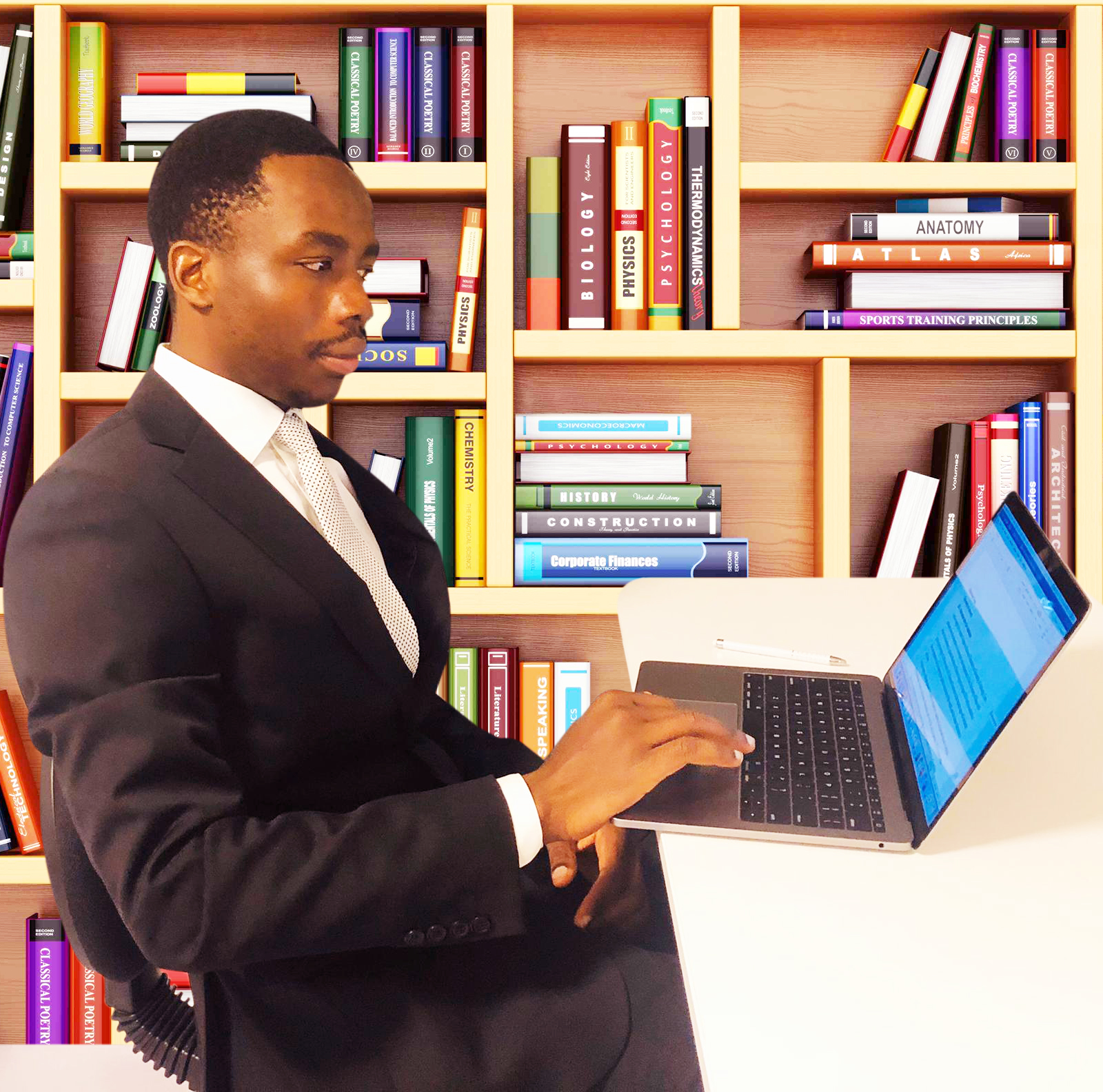To be honest, when I graduated from the University of Buea (UB) in 2016 with a BSc in Political Science and a Minor in History, I didn’t know what the future held for me. To begin with, apart from coming out top of my class, which fetched me a few francs in awards (50000 FCFA, the actual amount handed to me being 45000 FCFA), a little less than what I paid to travel to and from Buea to collect the money, I enrolled at UB with a bookish mindset, studying without paying attention to what I was going to do upon graduation, a trait that is common amongst a majority of Cameroonian high school graduates going to the university for the first time.
I had support from family, but I had little or no mentorship, which contributed to the challenges, and probably the ability to self-mentor, which I have had to deal with throughout my career trajectory. I had access to the internet, irrespective of the quality of the smartphone, but little did I know that what I was holding in my hand was the answer to the many opportunities in our digital age and time. Like many, it was more about posting pictures and paying attention to stuff that didn’t improve my life in any way professionally.
I took a few online courses on the website of the Young African Leaders Initiative (YALI), but that was it. I didn’t know I could register for and attend free or even paid workshops, conferences, seminars, and symposia on various aspects of my professional career development or preparation for graduate studies, such as CV and SOP writing and interview preps, amongst others. Maybe not because I did not have the skills; I didn’t also bother to apply for a job.
In the end, I applied for a master’s at UB, not because it was actually what I wanted to do but because it was the option on the table at the time. After all, it was obvious that I was going to be admitted, so why not go for it? I attended a few classes, and before the year could finish, the strike that metamorphosed into the ongoing war started. Buea became a hotspot after the student strike in late 2016. As a result, I returned to my village. I wouldn’t say with no hope for the future because I am not in support of the idea that those who stay in villages are doomed.
Indeed, in the context of Cameroon and much of Africa, where there is limited access to the internet and constant electricity blackouts, it is true that rural areas afford fewer opportunities than urban areas, but those limitations are also opportunities for those who can come up with alternatives or learn skills that can provide solutions to the electricity and internet connectivity needs of those in rural areas, apart from farming, which is the main economic and income-generating activity.
I remember me and my very good friend and brother, Nkeh Platini, used to be humorously mocked each time we went to the field to play soccer (I loved soccer and I still do) with others. They would say, “Are you not seeing that Legpa, as I was called, a nickname I still maintain, and Platini have gone to the university and still came back to be with us here in the village?” That is to say, in other words, that there is no value in education. It did hurt, and for a second, I actually thought that there was no value in going to school, a frustration I believe many Cameroonian degree holders share.
As someone who is passionate about education, most of what was said, no matter how painful, did not stop me from teaching. Something I had done since my high school days, even as a student; teaching history at GHS Tabenken. I also indulged in sand business during rainy seasons and constantly assisted my mother with farm work and house chores, being her only child who was in the village at the time. But that’s not how I made money.
I had one skill, thanks to curiosity and learning from my brother, of blessed memory: satellite installation. And that’s how I made money. I was one of the few people, and arguably the one with the highest customer base in the village, who installed satellite dishes. There were times I could make 20000–25000 FCFA in a day since I was installing one at 5000 FCFA. The price could be a little bit lower based on the customer, but that’s what I took.
I wish I knew at the time that teaching that skill to others was another source of income; I would have made millions starting an academy. Even though there were days and weeks that I didn’t have a single customer, at least I knew that one customer in a month with two satellite dishes would give me 10,000 FCFA, and if I had five customers in a month, I would be making just about the minimum wage in Cameroon added to the other minor sources of income I had.
What lessons can you learn from this story if you are wearing the graduation gown this December? Times and personal circumstances may differ, but I bet you that there are plenty of lessons you can learn from my experience, a few of which I have highlighted below:
1. Reflecting on my journey, I realise I could have utilised digital resources for more than social networking. For graduates like myself, it’s crucial to explore online courses, webinars, and digital networking to enhance professional growth. These tools offer vast opportunities for skill development and global connectivity.
2. My experience taught me the significant impact of mentorship, or the lack thereof. As a graduate, I recommend actively seeking mentors who can offer guidance, advice, and insights. A good mentor can provide a roadmap through complex career landscapes and offer invaluable wisdom.
3. My formal education was just the beginning. Continuous learning, as I found with platforms like YALI, is essential. I advise graduates to constantly seek new knowledge, especially in rapidly evolving fields, to stay relevant and adaptive.
4. My varied engagements in teaching, sand business, and satellite dish installation were crucial. I learned the importance of not relying on a single income source. Graduates should be open to exploring multiple, sometimes unconventional, income streams for financial stability and growth.
5. My success in satellite installation revealed the importance of practical skills alongside academic knowledge. I encourage graduates to acquire and refine practical, hands-on skills that are in demand in today’s job market.
6. My return to the village was challenging, but it taught me resilience. For graduates, it’s vital to stay resilient and persistent, even when facing setbacks. Life’s path isn’t always smooth, but perseverance can lead to unexpected opportunities.
7. Having ‘good’ family and friends all around you and providing value to your community is a source of support and opportunity. I advise graduates to actively engage with their communities and build a supportive network. Relationships can open doors that degrees and skills alone cannot.
8. Teaching history was my passion, but it didn’t pay much. Graduates should strive to find a balance between following their passions and making practical decisions, especially regarding financial stability.
9. My addition of entrepreneurship to academic work shows the importance of being adaptable. Graduates should be open to changing their career paths as new interests and opportunities arise. Flexibility can lead to fulfilling and unexpected career journeys. I have continued today with Ngenge-PostGrad Solutions and Africa Online & Publications Library.
10. My move back to the village highlights the disparities between rural and urban opportunities. For graduates, understanding these differences is key. There’s potential in exploring ways to introduce innovative solutions to rural areas, bridging the gap, and finding new opportunities in less obvious places.
Reflecting on the journey that I have had so far, I can’t help but feel a sense of fulfilment. It has been anything but ordinary—a mix of opportunities, challenges, resilience, and unexpected turns. From the bustling halls of the UB to the valley of Tabenken and beyond, each step has been a lesson, each setback a hidden opportunity.
The digital age, with its boundless possibilities, was at my fingertips from the very beginning, yet I initially failed to harness it. The lessons I’ve learned are not just mine to keep but to share.
I encourage everyone putting on their graduation gowns and entering the job market to embrace the digital world but not let it enslave them. Seek mentors, engage in continuous learning, and never underestimate the value of practical skills. Be resilient, adaptable, and always remember that every challenge is cloaked in opportunity.
Embrace the unexpected, find wealth in simplicity, and understand that true education goes beyond the classroom walls.





